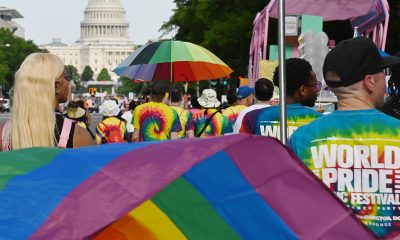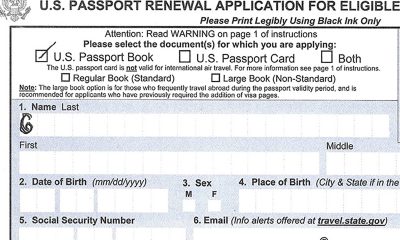Local
The scientific activist
Harvard award draws attention to Frank Kameny’s pre-activist days
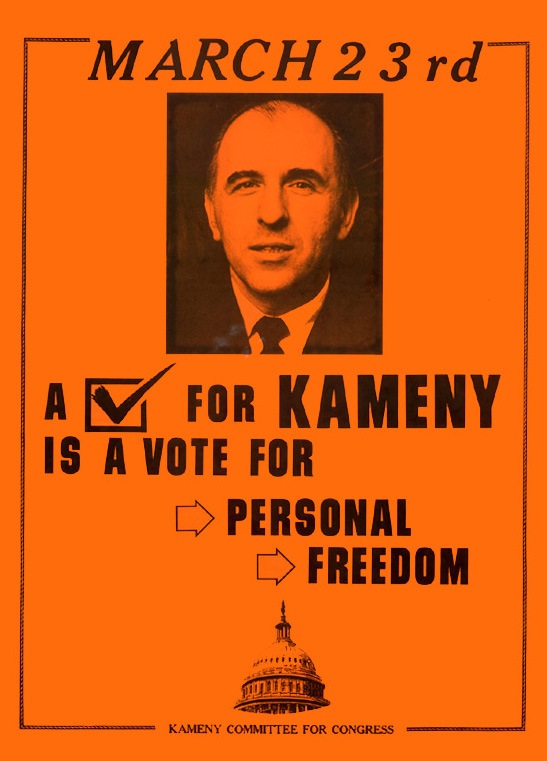
Veteran gay rights leader Frank Kameny, who is credited with founding the gay activist movement in Washington 41 years ago, returned to Cambridge, Mass., last month to receive an award from the Harvard University Gay & Lesbian Caucus. Kameny, 77, received a master’s degree from Harvard in 1949 and his Ph.D. there in 1956 — both in the field of astronomy.
With Harvard University President Lawrence Summers looking on, about 200 Harvard gay students and gay alumni gave Kameny a standing ovation on June 6 as an official with the Gay & Lesbian Caucus introduced Kameny at a ceremony on the Harvard campus.
The award presented to Kameny at the ceremony honors him for “his longstanding advocacy and activism and his incredible personal commitment and contribution to the lives of all gay, lesbian, bisexual, and transgender people.”
In an interview this week, Kameny said his return to Harvard brought back memories of his pre-gay activist days — including his studies at Harvard, his early ambitions to become an astronomer and become involved in the U.S. space program, and his service in the military during World War II.
Kameny rarely talks about his pre-activist days in his public appearances on behalf of gay rights. His friends and colleagues in the gay rights movement say those early years played a key role in shaping what observers say has been Kameny’s groundbreaking work on behalf of gays in D.C. and throughout the nation.
Long-time activists know Kameny for his role as founder in 1961 of the Mattachine Society of Washington, D.C., the first gay rights group in the nation’s capital. Shortly after its founding, Kameny broke new ground by leading the first ever gay rights protests in front of the White House, Pentagon and State Department.
Those who know Kameny say few people are aware of his use of the scientific principles and knowledge he acquired in the study of physics and astronomy to debunk the psychiatric theories of the 1950s and 1960s, which held that homosexuality was an illness and that gays suffered from a psychiatric disorder.
In his 1981 book, “Homosexuality and American Psychiatry: The Politics of Diagnosis,” researcher Ronald Bayer credits Kameny with almost single-handedly persuading the early homophile movement to change its position of accepting the prevailing psychiatric theories that gays were disordered to the posture that these theories were scientifically unsound and must be refuted.
Kameny said his love for science began in his teenage years in New York City’s borough of Queens. He graduated from Richmond Hill High School in 1941, at the age of 16, after skipping two grades, in part, because of his exceptional aptitude for science and math. In September 1941, Kameny began his undergraduate studies in physics at New York’s Queens College.
He said he had expected to immerse himself “in the sheer joy” of courses in math and physics, along with other college related activities. But all of that changed abruptly three months later when the Japanese attacked Pearl Harbor. “Nothing was the same after that,” Kameny said.
Two years later, in May 1943, Kameny enlisted in the Army, signing his enlistment papers three days before his 18th birthday. In September of that year, he was called into active duty, where he remained until March 1946. Although he had two years of college under his belt, Kameny said his Army superiors assigned him to a mortar crew with the 58th Armored Infantry, which was part of the Army’s 8th Armored Division in Europe.
Before he knew it, Kameny said, he was engaged in front-line combat in France, Holland and Germany. Some of his most harrowing moments, he said, came during the Battle of the Bulge, where the German army made a ferocious effort to break through the lines of allied forces. Stationed in trenches during freezing whether, Kameny recounts how he and his fellow soldiers endured German artillery fire while trying to catch some sleep in the dead of night.
“I came within a hair’s breadth of losing my life several times,” Kameny said. “If you hear the whistle of a shell and then the explosion, you’re OK,” he said. “But if the whistle stops suddenly, before the explosion, you’re in gave danger of being hit.”
Years later, Kameny would wear the combat medal he earned in the Battle of the Bulge as he led the D.C. Gay & Lesbian Activists Alliance in presenting its annual Memorial Day wreath at the Tomb of the Unknown Soldier at Arlington National Cemetery.
Space ambitions jettisoned
At the conclusion of the war, Kameny returned to Queens College after being discharged from the Army in 1946. He completed his undergraduate work less than two years later and began his studies at Harvard. While there, he taught astronomy at Yale University and later traveled to Arizona and Northern Island, where he conducted research in astronomy at internationally acclaimed observatories. After receiving his PhD. at Harvard in 1956, he began teaching astronomy at Georgetown University.
In 1957, he left Georgetown after being recruited by the government to take a job as an astronomer with the Army Map Service in Washington. The nation’s race against the Russians for superiority in space had just begun in full force. Kameny had set his sights, among other things, on a possible role in the U.S. space program. A short time later, Congress created the National Aeronautics & Space Administration. Kameny has said he would have seriously considered applying to become an astronaut. But that was not to come about.
Just five months into his job at the Army Map Service, U.S. government security officials discovered Kameny was gay and opened an investigation into Kameny’s alleged “threat” to national security. Within a few weeks, he was dismissed from his job, with his name placed on a list of people labeled as government security risks.
Kameny fought his dismissal in court, taking it all the way to the U.S. Supreme Court, where he became the first to challenge a firing by the federal government on grounds of sexual orientation. The high court let stand a lower court ruling against Kameny, effectively ending his career as a civil servant and an astronomer.
What Kameny did next, as the saying goes, is part of history — at least the history of the U.S. gay civil rights movement. His longtime friend and fellow activist, Craig Howell, has said that had it not been for the government’s discovery of his sexual orientation, Kameny would likely have become one of the world’s eminent astronomers.
“The government’s loss became our gain,” said Howell.

Virginia
Va. officials investigate Loudoun County schools over trans student in locker room
Boys’ complaints prompted LCPS to investigate them for Title IX violations

Governor Glenn Youngkin and Attorney General Jason Miyares on Tuesday announced they have launched an investigation into how Loudoun County Public Schools has handled the case of three male high school students who complained about a transgender student in a boys’ locker room.
One of the boys’ fathers told WJLA that Loudoun County public schools launched an investigation into whether his son and the two other boys sexually harassed the student after they said they felt uncomfortable with her in the locker room at Stone Bridge High School in Ashburn.
“He was questioning why there was a female in the males’ locker room,” the father told WJLA. “And other boys were uncomfortable [with a female in the boys’ locker room].”
“There were other boys asking the same question,” he added. “They [LCPS] created a very uncomfortable situation. They’re young, they’re 15 years old. They’re expressing their opinions, and now they’re being targeted for expressing those opinions.”
WJLA notes Loudoun County public schools allows students to use bathrooms and locker rooms based on their gender identity. The father who spoke with WJLA said Loudoun County public schools should reverse the policy and dismiss the Title IX complaint it has brought against his son and the two other boys.
The Richmond-based Founding Freedoms Law Center is representing the boys and their families.
“It’s deeply concerning to read reports of yet another incident in Loudoun County schools where members of the opposite sex are violating the privacy of students in locker rooms,” said Youngkin in a statement that announced the investigation. “Even more alarming, the victims of this violation are the ones being investigated — this is beyond belief. I’ve asked Attorney General Miyares to investigate this situation immediately so that every student’s privacy, dignity, and safety are upheld.”
“Students who express legitimate concerns about sharing locker rooms with individuals of the opposite biological sex should not be subjected to harassment or discrimination claims,” added the Republican.
The Virginia Department of Education in 2023 announced the new guidelines for trans and nonbinary students for which Youngkin asked. Equality Virginia and other advocacy groups claim they, among other things, forcibly out trans and nonbinary students.
The U.S. Department of Education’s Office of Civil Rights in February launched an investigation into whether Loudoun County and four other Northern Virginia school districts’ policies in support of trans and nonbinary students violate Title IX and President Donald Trump’s executive order that prohibits federally funded educational institutions from promoting “gender ideology.”
a&e features
Your guide to the many Pride celebrations in D.C. region
Scores of events scheduled across DMV amid WorldPride excitement
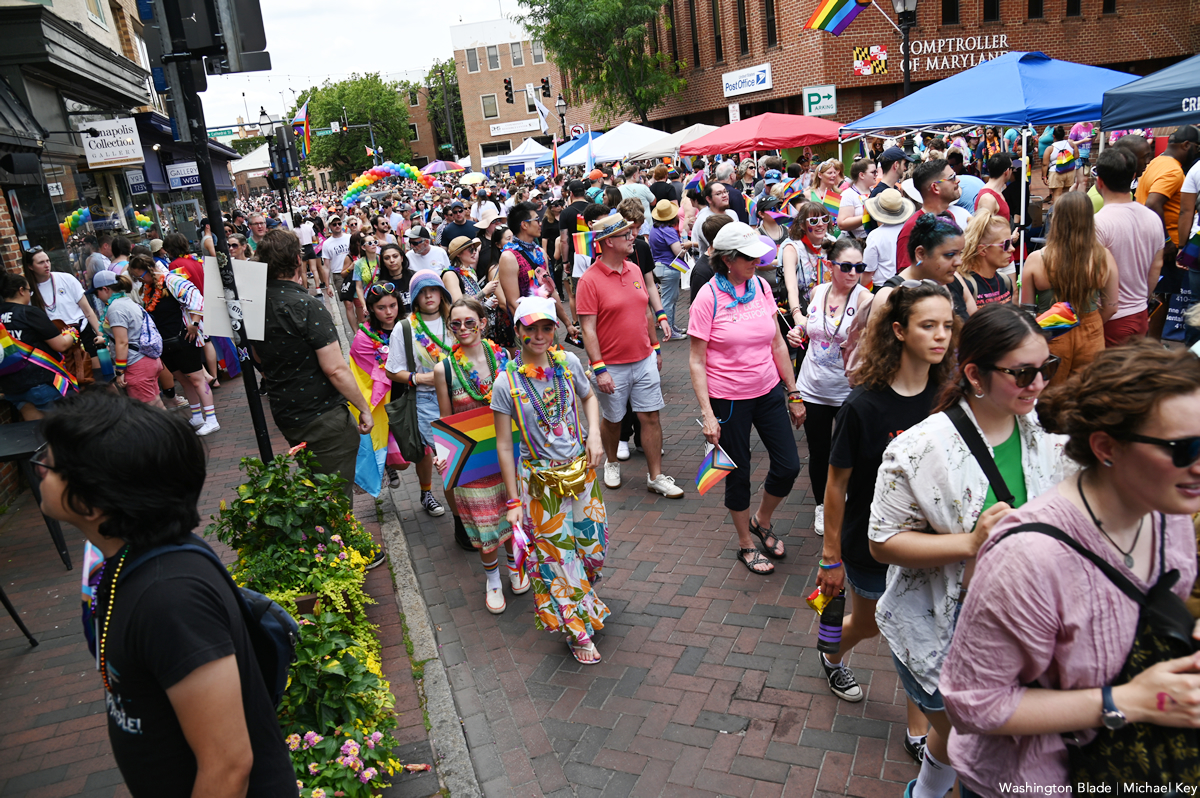
June is just around the corner, but Pride events have already begun in the region. There are many events scheduled in D.C. for WorldPride 2025, as well as for D.C. Black Pride, Trans Pride, Silver Pride, Latinx Pride, API Pride and Youth Pride. Cities and towns in the region also offer their own LGBTQ Pride festivals and parades.
D.C. API Pride has events scheduled from May 17-June 8 with meetings, shows, concerts, workshops and socials. Highlights include the API Pride Welcome Reception on Wednesday, June 4 at the National Union Building (918 F Street, N.W.); a screening of Saving Face with Director Alice Wu on Sunday June 1 from 2-4 p.m. at the Smithsonian Asian Art Museum (1050 Independence Avenue, S.W.); the Desi & South Asian Drag Show on Thursday, June 5 from 10 p.m. to 2 a.m. at Sinners & Saints (639 Florida Avenue, N.W.); and the QTAPI Nightlife Extravaganza on Friday, June 6 from 10 p.m. to 3 a.m. at Koi Lounge (1413 K Street, N.W.) Visit qtapidc.org/apipride for more information and to register for events.
D.C. Silver Pride is scheduled for Wednesday, May 21 from 4-7 p.m. at the Eaton Hotel (1201 K Street, N.W.). The resource fair and tea dance is hosted by Rayceen Pendarvis.
D.C. Latinx Pride has events scheduled from May 16-June 19. Highlights include a kickoff reception on Thursday, May 22 from 8-10 p.m. at Shakers DC (2014 9th Street, N.W.); La Fe, a celebration of faith and resilience, at the Metropolitan Community Church of Washington (474 Ridge Street, N.W.) on Sunday, May 25 from 10:30 a.m. until 1:30 p.m.; La Fiesta: the Official Latinx Pride Party at Bunker (2001 14th Street, N.W.) on Thursday, May 29 at from 9 p.m. until 3 a.m.; as well as parties, a history walking tour, a film festival, panel discussions and more. Tickets are available for the Official Latinx Pride Party at latinxhistoryproject.org and run from $15 to $76.
Trans Pride Washington, D.C. is scheduled for May 17 beginning with registration at 9:30 a.m., a resource fair from 10 a.m.-4 p.m., panel discussions and workshops throughout the day, the Engendered Spirit Awards at 4 and a keynote speech by Schuyler Bailar with an afterparty scheduled for 6-9:30 p.m. RSVP at transpridewashingtondc.org. Location is shared after RSVP.
D.C. Youth Pride has events scheduled from May 30-June 7 in various locations throughout the city. Registration is free but required. Youth Pride Day is scheduled for May 31 from 10 a.m. to 2 p.m. at Woolly Mammoth Theater Company (641 D Street, N.W.). The event is for LGBTQ+ youth ages 6-18 years old and their parents/caregivers/family (those over 18 must be accompanying an attendee 18 years of age or younger). Register on Eventbrite. Other events include the “Pride Rising” event on Friday, May 30 for LGBTQ+ young adults, a Teen Pride Night, a book launch and a “Proud to Teach” mixer for LGBTQ+ educations at Crush Dance Bar (2007 14th Street, N.W.) on Thursday, June 5 from 6-8:30 p.m.
D.C. Black Pride
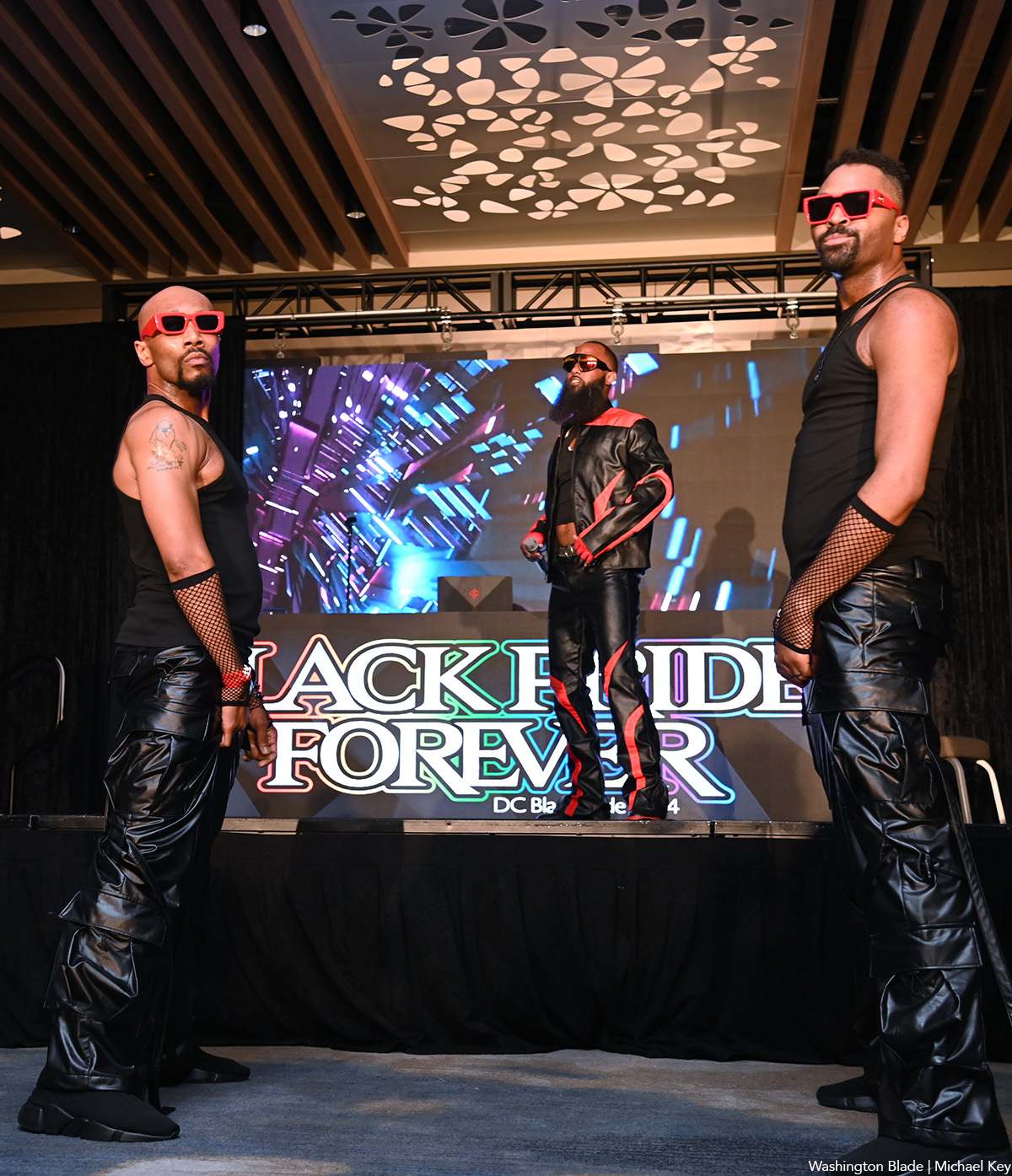
The 34th annual D.C. Black Pride has events scheduled from Wednesday, May 21 through Monday, May 26 at the Capital Hilton (1101 16th Street, N.W.) and other venues throughout the city.
Thurst Lounge (2204 14th Street, N.W.) is holding a Thurstnik Reloaded extended hours nightlife event from May 21-26. The event is free; no tickets or wristbands are required.
Xavier Entertainment presents 5 days with 8 events for Black Pride with Supreme Fantasy 2025 from May 22-26. Passes are available at xavierpartydc.com. Events include the DC Black World Pride Kickoff party at Nellie’s Sports Bar (900 U Street, N.W.) on Thursday, May 22; the 3000 Men Block party at Karma (2221 Adams Place, N.E.) on Friday, May 23; Official DC Black Pride After Hours parties at Power Nightclub (2335 Bladensburg Road, N.E.) are scheduled for Saturday, May 24, Sunday, May 25 and Monday, May 26 from 4-8 a.m.; the Cook Out Party is scheduled for Saturday, May 24 from 5-9 p.m. at Aqua Nightclub (1818 New York Avenue, N.E.); the 5000 Men Meatloaf Saturday Rooftop Party featuring headliner Yung Miami at Public Nightclub (1214 18th Street, N.W.) on Saturday, May 24 from 10 p.m. to 4 a.m.; the DC Black World Pride Main Event at Nellie’s Sports Bar (900 U Street, N.W.) is scheduled for Sunday, May 25 starting at 4 p.m.; the Meatloaf After Dark party at Power Nightclub (2335 Bladensburg Road, N.E.) is scheduled for Monday, May 26 from 10 p.m. until 2 a.m.
The Welcome to D.C. Happy Hour is scheduled for Thursday, May 22 from 5-10 p.m. at Metrobar (640 Rhode Island Avenue, N.E.).
The Welcome to D.C. Happy Hour is scheduled for Thursday, May 22 from 5-10 p.m. at Decades Rooftop (1219 Connecticut Avenue, N.W.). Purchase tickets at blisspride.com.
The 9th annual D.C. Black Pride Unity Free Ball is scheduled for Thursday, May 22 from 9 p.m. until 1 a.m. at the Capital Hilton Hotel (1001 16th Street, N.W.). RSVP at Eventbrite for the free event.
Daryl Wilson Promotions presents The Pregame Act 1 party scheduled for Thursday, May 22 from 10 p.m. until 2 a.m. at The Ugly Mug (723 8th Street, S.E.).
The Welcome Reception is scheduled for Friday, May 23 at 3 p.m. until 9 a.m. on Saturday at the Capital Hilton Hotel (1001 16th Street, N.W.).
The 34th annual D.C. Black Pride Opening Reception is scheduled for Friday, May 23 from 5-10 p.m. at the Capital Hilton Hotel (1001 16th Street, N.W.). Special guests include Kerri Colby, TS Madison and Monroe Alise.
The Bliss Pastel Party, a women’s event, is scheduled for Friday, May 23 from 10 p.m. until 3 a.m. at Strand (1400 Eye Street, N.W.). $20 advance tickets are available at Blisspride.com.
The Capital House Music Festival salutes Sam the Man Burns at a free music festival featuring artists and DJs on May 24 from 10 a.m. until 9:30 p.m. at Alethia Tanner Park (227 Harry Thomas Way, N.E.).
The “For the Culture” Brunch Cruise is scheduled for Saturday, May 24 aboard The Spirit of Washington. Boarding time is 11:15 a.m. at the dock at 580 Water Street, S.W. The boat returns to the dock at 3 p.m.
The Writers Forum, a panel of Black, LGBTQ+ writers, is scheduled for Saturday, May 24 from 1-3 p.m. at the Capital Hilton Hotel (1001 16th Street, N.W.).
Daryl Wilson Promotions presents the “Infamous” Saturday Day Party on May 24 from 5-11 p.m. at The Park (1201 Half Street, S.E.).
The Mary Bowman Poetry Slam Open Mic is scheduled for Saturday, May 24 from 6-8 p.m. at the Capital Hilton Hotel (1001 16th Street, N.W.). Twelve of performance poets from around the country compete for over $1,500 in prizes in a night of poetry hosted by Kenneth Something.
The Pure Bliss Party, a women’s event, is scheduled for Saturday, May 24 from 10 p.m. until 3 a.m. at Strand (1400 Eye Street, N.W.). Tickets are $25 in advance and available at Blisspride.com.
The Capitol Ballroom Council presents Brunch & Babes: DC Black Pride WorldPride Edition at Hook Hall (3400 Georgia Avenue, N.W.) on Sunday, May 25 from noon until 4 p.m. The drag event, hosted by Sophia McIntosh, features a brunch buffet and giveaways. Tickets are $20-$80.
The Clubhouse 50th anniversary “Children’s Hour Party” with special guest Rochelle Fleming is scheduled for Sunday, May 25 from 3-9 p.m. at Bravo Bravo (1001 Connecticut Ave., N.W.).
Daryl Wilson Promotions presents The Wet Dreams Mega Day Party scheduled for Sunday, May 25 from 5-11 p.m. at The Bullpen (1201 Half Street, N.E.).
D.C. Black Pride 2025 Closeout – The Finale is scheduled for Sunday, May 25 from 6-10 p.m. at Twelve After Twelve (1212 18h Street, N.W.). $15 advance tickets are available at Blisspride.com.
Daryl Wilson Events is hosting the Sunday Night Super Party on Sunday, May 25 from 10 p.m. until 4 a.m. on Monday at The Park (920 14th Street, N.W.).
Pride in the Park is scheduled for Monday, May 26 from 12-7 p.m. at Fort Dupont Park (Minnesota Avenue, S.E.).
The World Pride Black Queer Film Festival is scheduled for May 27-29 from 6-9 p.m. at Howard University’s Blackburn Digital Auditorium (2397 6th Street, N.W.). The event is free, but RSVP and see descriptions of films and showtimes on Eventbrite.
D.C. WorldPride 2025
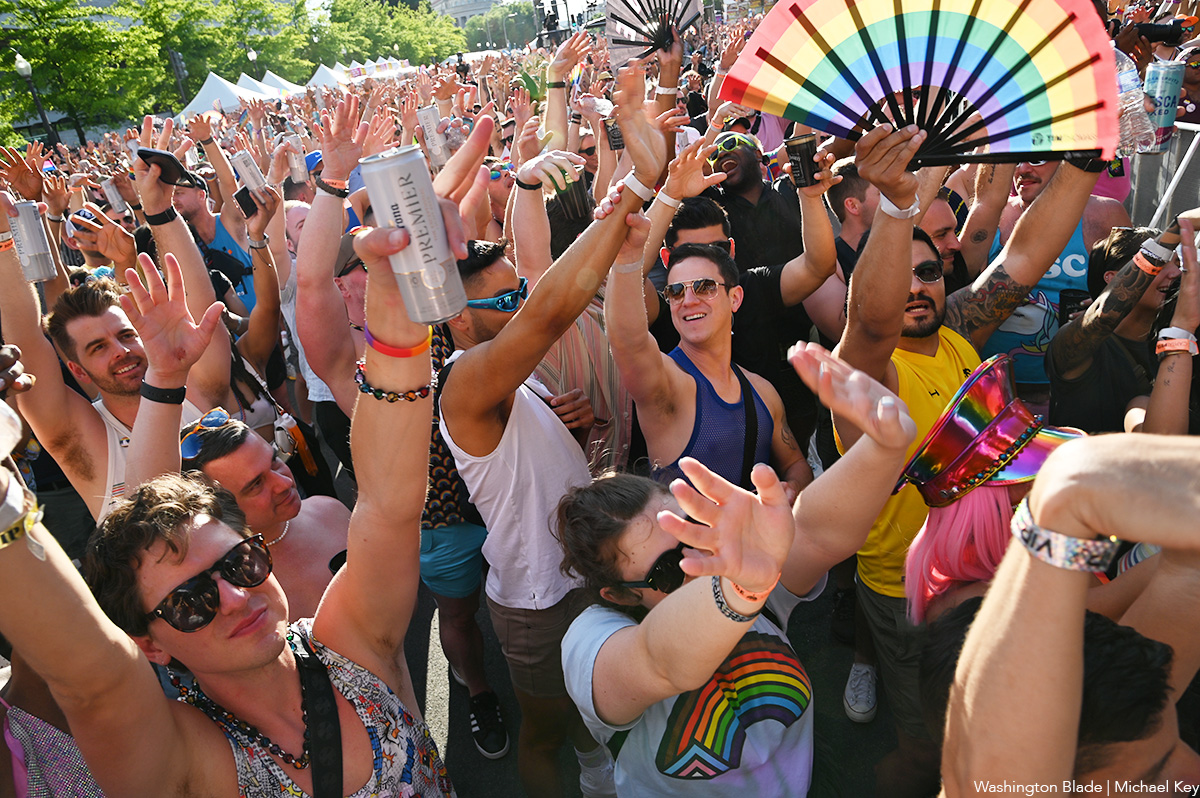
The international event WorldPride 2025 is to be held in Washington, D.C. from May 18-June 8. Events include a Choral Festival from May 23-June 8; a WorldPride Film Festival from May 27-29; the Capital Cup Sports Festival from May 30-June 4; a Human Rights Conference on June 4-6, as well as marches, concerts, parties, a street festival and more. Visit worldpridedc.org for more information on affiliated events.
The Gay Men’s Chorus of Washington is presenting the International Choral Festival for WorldPride 2025 with daily hour-long pop-up performances from singers from around the world on Friday, May 23 through Sunday, June 8 in venues throughout the city. The festival is free and open to the public, however, premium passes with reserved seating is available at GMCW.org.
The WorldPride Film Festival is scheduled for Tuesday, May 27 through Thursday, May 29 and includes LGBTQ-themed films from across the globe. Screenings are to be held at Alamo Drafthouse Cinema – Cojeaux Cinemas (630 Rhode Island Avenue, N.W. and 1660 Crystal Drive, Arlington, Va.) and Atlas Performing Arts Center – Sprenger Theater (1333 H Street, N.E.). Movie descriptions and showtimes are listed at worldpridedc.org.
Team D.C. is hosting the Capital Cup Sports Festival on Friday, May 30 through Wednesday, June 4 in multiple venues. Athletes from around the world compete in basketball, bocce, cornhole, climbing, swimming, darts, dodgeball, flag football, kickball, golf, pickleball, regatta, roller derby, rugby, soccer, tennis, volleyball and wrestling. The D.C. Front Runners annual Pride Run 5K at Congressional Cemetery on June 1 is included. Find a tentative schedule and registration information at worldpridedc.org.
The Welcome Ceremony + Concert is scheduled for Saturday, May 31 at National’s Park (1500 South Capitol Street, S.E.). Shakira is performing in her Las Mujeres Ya No Lloran World Tour. Tickets run from $108 to $730 and can be purchased through Ticketmaster.
The WorldPride Human Rights Conference is scheduled for Wednesday, June 4 through Friday June 6 at the JW Marriott (1331 Pennsylvania Avenue, N.W.). Featured speakers include the Right Reverend Mariann Edgar Budde, Dr. Lady Phyll and Paula Gerber. Early bird registration is available through capitalpride.org for $350, with virtual registration available for $200.
The National Trans Visibility March is holding a Policy and Safety Summit at the Hyatt Regency Crystal City at Reagan National Airport (2799 Richmond Highway, Arlington, Va.) on Thursday, June 5 through Friday, June 6. Find more information on panels and topics at ntvmarch.org.
The Capital Pride Honors are scheduled for Thursday, June 5 from 7-11 p.m. at the National Building Museum (401 F Street, N.W.). The red carpet gala includes live music, food and a formal awards ceremony for trailblazers in the LGBTQ+ community. Tickets are $105.25 and are available through capitalpride.org.
The Pride Celebration Concert with the International Pride Orchestra is scheduled for Thursday, June 5 at 7:30 at Strathmore Music Center (5301 Tuckerman Lane, North Bethesda, Md.). The International Pride Orchestra joins the Gay Men’s Chorus of Washington for an evening of music. Tickets run from $35-$100 and can be purchased through strathmore.org.
The World Pride Music Festival: Global Dance Party is scheduled for Friday, June 6 through Saturday, June 7 at RFK Festival Grounds (2500 Independence Avenue, S.E.). The two day festival spans three stages. Attendees must be 18 years of age or older to participate. Performers on Friday include Jennifer Lopez, Gallants, Marina, Paris Hilton, Rita Ora, Tinashe, Betty Who, LP Giobbi, Patrick Mason and Trisha Paytas among others, with a closing set by Zedd. Saturday performers include Troye Sivan, Grimes, Kim Petras, Purple Disco Machine, Ray, Sofi Tukker, Anabel Englund, Coco & Breezy, Crush Club, Aluna, Sasha Colby and a DJ set by RuPaul.
The WorldPride 17th Street Block Party is scheduled for Friday, June 6 from 5-10 p.m. and Saturday, June 7 from noon until 10 p.m. along 17th Street, N.W. in the Dupont Circle neighborhood. There will be a beverage garden and LGBTQ+ entertainment.
The Washington Blade is hosting the sixth annual Pride on the Pier Boat Parade & Fireworks Show at The Wharf (101 District Square, S.W.) on Friday, June 6 from 3-10 p.m. and Saturday, June 7 from noon until 10 p.m. The event is free, though VIP tickets are available for purchase on Eventbrite for $30. The boat parade is schedule for 7 p.m. on June 6, and the fireworks show is scheduled for 9 p.m. on June 7. More information is available at prideonthepierdc.com.
The Full Bloom: Friday Main Event is scheduled for Friday, June 6 at 9 p.m. at 1235 W Street, N.E. Tickets are $100 and available at capitalpride.org.
LUSH: The DC Lesbian Nightclub Experience is scheduled for June 6 at 10 p.m. at 618 DC (618 H Street, N.W.). Advance tickets are $15 at ra.co. The event is 21+ and features an “all-dyke DJ lineup” with Lady Lavender, Flotussin and Jacq Jill.
The WorldPride Parade is scheduled for Saturday, June 7 with the step off at 2 p.m. at 14th Street and T Street, N.W. The parade is slated to move down 14th street to Freedom Plaza and then Pennsylvania Avenue.
The WorldPride Street Festival is scheduled for Saturday, June 7 and Sunday June 8 for noon until 10 p.m. along Pennsylvania Avenue, N.W. between 9th and 3rd Streets. There will be food courts, beverage gardens, a Camp Pride Family Area / kids’ zone, community vendors, activities, entertainment and more.
The Post-Parade + Closing Concerts is scheduled for Saturday, June 7 through Sunday, June 8 at the Street Festival and Concert Grounds at 3rd Street and Pennsylvania Avenue, N.W. The event is free to the public, though Tier 2 VIP tickets are available (and quickly selling out) at capitalpride.org for $335.01 for the Saturday concert or $575.20 for Saturday and Sunday. Cynthia Erivo, David Archuleta, CeCe Peniston and Kristine W take the stage on Saturday for the post-parade. Doechii, Khalid, Brooke Eden, 2AM Ricky, Parker Matthews and MkX are scheduled to perform in the Sunday Closing Concert.
The Fabric of Freedom Main Saturday Event is scheduled for June 7 at 10 p.m. at 1235 W Street, N.E. KINETIC Presents and the Capital Pride Alliance host the party featuring three stages, over 100,000 square feet of dance floor, and a performance by Pabllo Vittar. Tickets are available for purchase at capitalpride.org and run from $120.92 to $188.80.
Unwraveled: The Official Women’s Party for WorldPride 2025 is scheduled for Saturday, June 7 from 10 p.m. to 4 a.m. at The Park at 14th (920 14th Street, N.W.). Tickets run from $63.48 to $105.25 and are available for purchase at capitalpride.org.
The International Rally + March on Washington for Freedom is scheduled for Sunday, June 8 with the rally beginning at 9:30 a.m. and the march kicking off from the Lincoln Memorial (2 Lincoln Memorial Circle, N.W.) at noon. The march will end near the U.S. Capitol Building for the WorldPride DC Street Festival and Closing Concert.
Visit worldpridedc.org/events to see a full list of partner and affiliate events for WorldPride 2025 in Washington, D.C.
Regional Prides
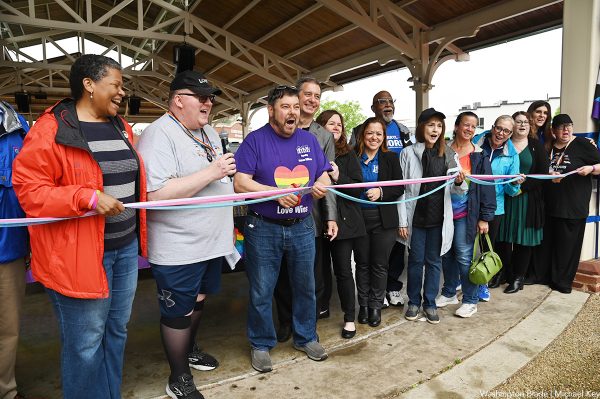
The fourth annual Equality Prince William Pride is to be held on Saturday, May 17 at the Harris Pavilion (9201 Center Street, Manassas, Va.) from noon until 4 p.m. The family-friendly event is held in the historic center of Old Town Manassas.
The second annual Herndon Pride is being held at Arts Herndon (750 Center Street, Herndon, Va.) on Saturday, May 24 from noon until 5 p.m.
Annapolis Pride, one of the larger Pride celebrations in the region, includes both a parade and festival on Saturday, May 31. The parade is scheduled to begin at 11 a.m. at the intersection of Calvert and Bladen Streets and end at Amos Garrett Boulevard off of West Street. The festival is to be held at Maryland Hall (801 Chase Street, Annapolis, Md.) from noon until 5 p.m.
The 2025 Arlington Pride Festival is scheduled for Saturday, May 31 from 9 a.m. to 6 p.m. at the Hyatt Regency Crystal City (2799 Richmond Highway, Arlington, Va.). The indoor event is free. A number of other ticketed events ($30-$250) are scheduled for Arlington Pride as well, including a pageant hosted by Shi-Queeta Lee, a drag brunch, speed dating and an afterparty.
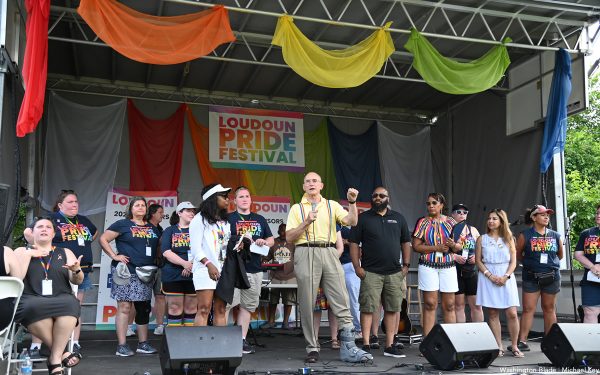
The fourth annual Loudoun Pride Festival is scheduled for Saturday, May 31 from noon until 6 p.m. at Ida Lee Park (60 Ida Lee Drive N.W., Leesburg, Va.). The ticketed event ($5) includes musical performances, a magic show, face painting, bounce houses, food vendors, an alcohol pavilion and the return of “Dragstravaganza.”
Page County / Luray Pride is set for Saturday, May 31 from noon until 5 p.m. at River’s Bend Ranch (397 Riverbend Rd., Stanley, Va.). The family-friendly event is free, but horseback riding is available for those who sign up in advance for $60 + tip to trail guide.
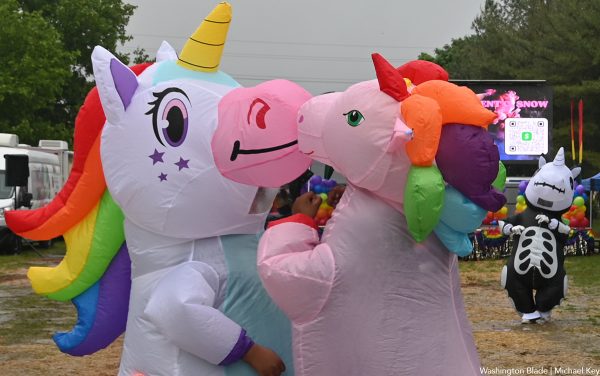
The Charles County Department of Health is holding the third annual PrEP for Pride at 4545 Crain Highway in White Plains, Md. from noon until 5 p.m. on Saturday, May 31. The free festival includes a spirited Pride Walk, entertainment and vendors.
Reston Pride is scheduled for Saturday, May 31 from 6-9 p.m. and Sunday, June 1 from 11 a.m.-6 p.m. at Lake Anne Plaza (1609 Washington Plaza N., Reston, Va.). The free events planned for the weekend include the Rising Voices! Community Concert on Saturday and the Pride Festival on Sunday.
The third annual Culpeper Pride Festival is scheduled for Sunday, June 1 from noon until 5 p.m. at the Mountain Run Winery (10753 Mountain Run Lake Road, Culpeper, Va.). The free event includes music, vendors, a 2 p.m. runway contest. An after hours drag show is scheduled for 6-8 p.m., with tickets available for $10.
The City of Rockville Human Rights Commission is hosting the ninth annual Rockville Pride Festival on Sunday, June 1 from 2-5 p.m. at Rockville Town Square (131 Gibbs Street, Rockville, Md.).
The fourth annual Portsmouth Pride Fest is scheduled for Sunday, June 1 from 11 a.m. until 5 p.m. at Portsmouth Festival Park (16 Crawford Circle, Portsmouth, Va.). The family-friendly free event includes entertainment, vendors, community information and a dog park.
Fairfax Pride is scheduled for Saturday, June 7 from 9:30-11:30 a.m. at the Stacy C. Sherwood Center (3740 Blenheim Boulevard, Fairfax, Va.). The Fairfax Pride Launch Event hosted by Fairfax City and George Mason University is set to include children’s activities, crafts, and more.
The 4th annual Mosaic Pride is coming to the Mosaic District (District Avenue, Fairfax, Va.) with drag shows, live music and more on Saturday, June 14 from 3-9 p.m. The day’s events include a 3 p.m. parade, drag story time with Tara Hoot and an aerialist performance.
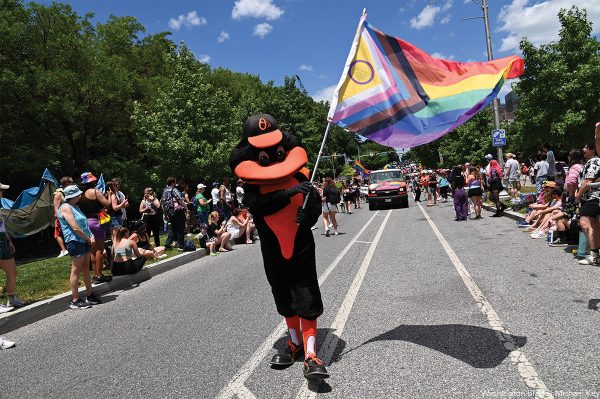
The 50th annual Baltimore Pride is to be held June 8-15. The full list of scheduled events has not yet been released, but generally includes the Baltimore Pride Parade and the Baltimore Pride Festival. Check back with the Washington Blade for more specific event times as they become available.
The fourth annual Delmarva Pride Festival is scheduled for Saturday, June 14 from 11 a.m. to 4 p.m. at S. Harrison and E. Dover Streets in Easton, Md. The free event includes vendors and entertainment. Other Delmarva Pride events scheduled over the weekend include “A Night in New Orleans” concert and dance on Thursday, June 12 at 7 p.m. at the Garfield Center for the Arts (210 High Street, Chestertown, Md.), as well as a drag show and art event on Friday, a dance (18+) on Saturday and a Pride Brunch on Sunday.
Hampton Roads Pride Weekend is scheduled for June 20-22. Weekend events include a unique boat parade, a Pridefest, a block party and more.
The fifth annual Catonsville Pride is scheduled for Saturday, June 21 from 2-5 p.m. at Catonsville Presbyterian Church (1400 Frederick Road, Catonsville, Md.). The ticketed event ($4-$5) is a charity fundraiser with all net proceeds slated to go to the Journeys Cottage at The Children’s Home (a safe space for trans youth).
The 13th annual Hagerstown Pride is scheduled for Saturday, June 21 from noon until 6 p.m. at Doubs Woods Park (1307 Maryland Avenue, Hagerstown, Md.).
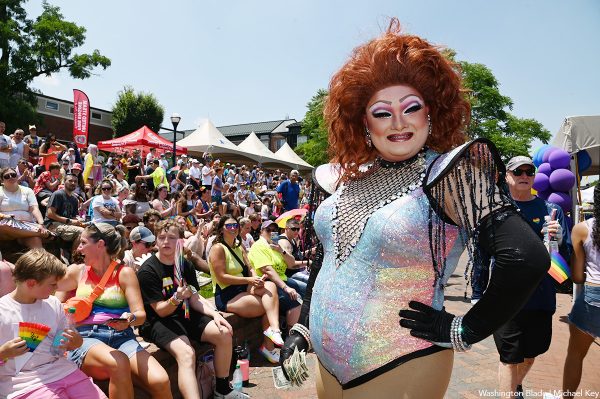
The 12th annual Frederick Pride Festival is scheduled for Saturday, June 28 from 11 a.m. to 6 p.m. at Carroll Creek Linear Park (50 Carroll Creek Way, Frederick, Md.). The free event includes a full food truck court, a beverage garden, hundreds of vendors, a car show, musical guests, drag performances, a children’s area and more.
The eighth annual Alexandria Pride Fair is scheduled for Saturday, June 28 from 3-6 p.m. at Alexandria City Hall and Market Square (301 King Street, Alexandria, Va.). The free event includes exhibitors and vendors, a drag story hour, food trucks, live music, health services a mobile art lab, dancing are more.
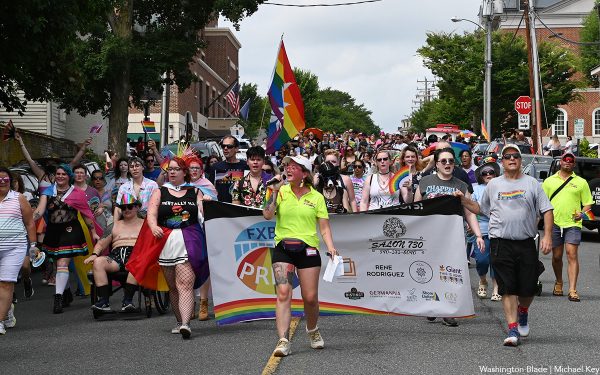
FXBG PRIDE (Fredericksburg, Va.) is scheduled for Saturday, June 28 with a march set to begin with speeches at 10 a.m. at Riverfront Park (701 Sophia Street, Fredericksburg, Va.) and move through downtown Fredericksburg. Following the march, the FXBG Pride Festival is scheduled from 11 a.m.-4 p.m. at Riverfront Park. An afterparty at Market Square (214 William Street, Fredericksburg, Va.) is scheduled for 6-11 p.m., with 18+ after 9 p.m. All events are free.
The 2025 Salisbury Pride Parade and Festival is scheduled for Saturday, June 28. The parade is planned to begin at 3 p.m. and move along Main Street in downtown Salisbury, Md. The festival is to run from 2-6:30 p.m.
The Montgomery County Pride in the Plaza is scheduled for Sunday, June 29 from noon until 8 p.m. at Veterans Plaza (1 Veterans Place, Silver Spring, Md.).
Cumberland Pride is scheduled for Sunday, June 29 from noon until 4 p.m. at Canal Place (13 Canal Street, Cumberland, Md.). The free event includes entertainment, vendors and more.
Some cities have opted for Pride celebrations later in the year. Pride festivals in Front Royal, Va. and Westminster, Md. are slated for July 26. C’ville Pride Festival (Charlottesville, Va.), Shenandoah Valley Pride (Harrisonburg, Va.) and Virginia Pridefest (Richmond, Va.) are scheduled for September. Staunton Pride (Staunton, Va.), Southwest Virginia Pride (Salem, Va.), Winchester Pride (Winchester, Va.) and HoCo Pride (Columbia, Md.) are scheduled for October.
District of Columbia
Opening of Pride exhibition at Smithsonian’s African art museum postponed until 2026
Exhibition initially planned to open before WorldPride
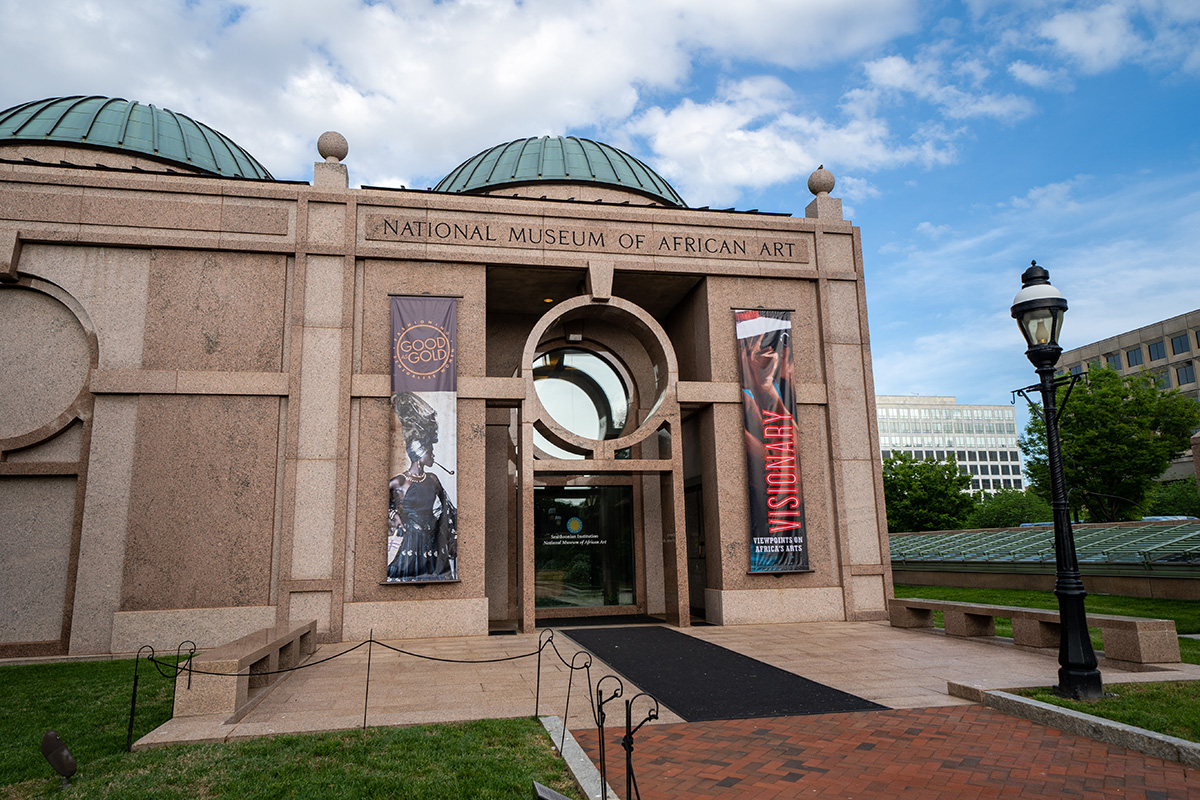
An exhibition of the works of art from LGBTQ African artists at the Smithsonian Institution’s National Museum of African Art was abruptly postponed due to “our current budgetary situation,” a museum spokesperson told the Washington Post.
The exhibition is entitled, “Here: Pride and Belonging in African Art.”
The Post, which broke the story about LGBTQ exhibition’s postponement on May 6, reports that the museum denied that the postponement was brought about by the Trump-Vance administration’s executive order restricting certain content at Smithsonian museums or the current political climate.
“This exhibition was on a very ambitious schedule to meet WorldPride, and we did not have enough time to secure all the private sector funds we had hoped to due to shifts in the fundraising environment,” the Post quoted Smithsonian spokesperson Jennifer Mitchell as saying.
Mitchell was referring to plans to open the exhibition in late May to coincide with the WorldPride events, which are scheduled to take place in D.C. from May 17-June 6.
The Post reports that the exhibition is now expected to open in February 2026 and to close at its originally scheduled closing time in August 2026.
The National Museum of African Art’s website describes the LGBTQ exhibition as consisting of “artists across Africa and the diaspora whose artworks connect to their identities and experiences as LGBTQ+ people.” It says those people are “featured as the first continental and diasporic survey of its scale and scope outside of Africa.”
The website statement adds, “The show assembles artists whose work has implicitly or explicitly challenged local and global legacies of homophobia and bigotry, offering images of alternative futures as well as celebrations of intimacy, faith, family, and joy.”
The Post reported that Mitchell “declined to say whether donors had withdrawn their support, explaining that she could not comment on private donors relations.”
Sources familiar with the Smithsonian have pointed out that private donors, including corporations, are the main source of funding for specific Smithsonian exhibitions. The federal government, with funds approved by Congress, traditionally has covered costs supporting the museum buildings, infrastructure, and upkeep.
-
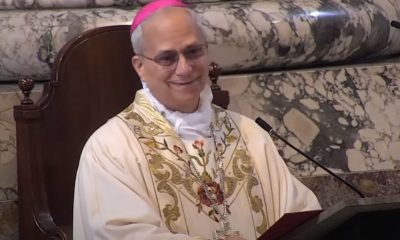
 The Vatican19 hours ago
The Vatican19 hours agoAmerican cardinal chosen as next pope
-
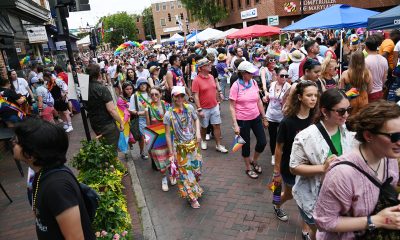
 a&e features1 day ago
a&e features1 day agoYour guide to the many Pride celebrations in D.C. region
-

 U.S. Supreme Court3 days ago
U.S. Supreme Court3 days agoSupreme Court allows Trump admin to enforce trans military ban
-
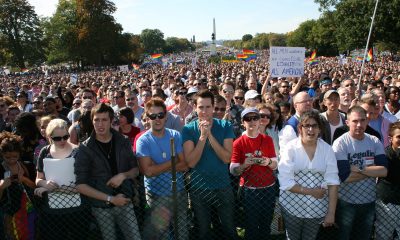
 District of Columbia2 days ago
District of Columbia2 days agoWorldPride permits for National Mall have yet to be approved


